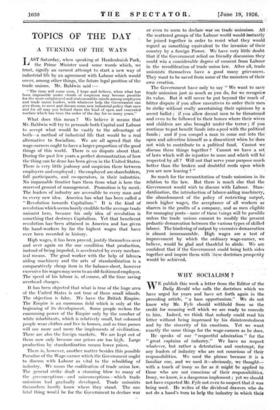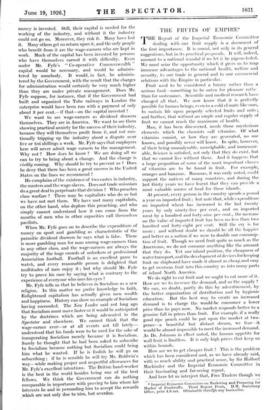WHY SOCIALISM
NIVE publish this week a letter from the Editor of the Daily Herald who calls the doctrines which we have urged for years and have set forth- again in the preceding article, " a base opportunism." We do not know why Mr. Fyfe should withhold from us the credit for meaning well which we are ready to concede to him. Indeed, we think that nobody could read his letter without being impressed by his disinterestedness and by the sincerity of his emotions. Yet we want exactly the same things for the wage-earners as he does.
He speaks of our " respectful admiration " for the " great captains of industry." We have no respect whatever, but rather a deteStation and contempt, for any leaders of industry who are not conscious of their responsibilities. We used the phrase because it is a familiar one, and we used itobviously, we thought— with a touch of -irony so far as it might be applied to those who are not conscious of their responsibilities. Irony, we know, is a dangerous implement ; yet we should not have expected Mr. Fyfe not even to suspect that it was being used. He writes of the dividend drawers who do not do a hand's turn to help the industry in which their money is invested. Still, their capital is needed for the working of the industry, and without it the industry could not go on. Moreover, they risk it. Many have lost it. Many others get no return upon it, and the only people who benefit from it are the wage-earners who are kept in work. Much of the capital has been invested by persons who have themselves earned it with difficulty. Even under Mr. . Fyfe's " Co-operative Commonwcaltli " capital would be necessary, and would be adminis- tered by somebody. It would, in fact, be adminis- tered by the Government, with the result that the charges for administration would certainly be very much higher than they are under private management. Does Mr. Fyfe suppose, for instance, that if the Government had built and organized the Tube railways in London the enterprise would have been run with a payment of only about 3 per cent.—if that—on the capital invested ?
We want to see wage-earners as dividend drawers themselves. They are in America. We want to see them showing practical anxiety for the success of their industry, because they will themselves profit from it, and not con- tinually tripping up the industry about a dispute over five or teri shillings a week. Mr. Fyfc says that employers here will never admit wage earners to the management. Why not ? How does he know ? We arc doing all we can to try to bring about a change. And the change is visibly coming. Why .should he try to prevent us ? Does he deny that there has been a great success in the United States on the lines we recommend ?
He complains of the existence of two castes in industry, the masters and the wage-slaVes. Does not trade unionism do a great deal to perpetuate that division ? Who preaches class warfare ? There may be capitalists who do so but we have not met them. We have met many capitalists, on the other hand, who deplore this preaching, and who simply cannot understand how it can come from the mouths of men who in other capacities call themselves pacffisti.
When Mi. Fyfe goes on to describe the expenditure of money on sport and gambling as characteristic of the parasitic dividend drawers he says what is false. There is more gambling man for man among wage-earners than in any other class, and the wage-earners are always the majority of the huge crowds of onlookers at professional Association football. Football is an excellent game to watch, and every reasonable person is delighted that multitudes of men enjoy it ; but why should Mr. Fyfe try to prove his case by saying what is contrary to the experience of everyone who uses his eyes ?
• Mr. Fyfe" tells us that he believes in Socialism as a new religion. In this matter we prefer knowledge to faith. Enlightened capitalism has actually given men wealth and happiness. History can show no example of Socialism having succeeded. The New Leader said not long ago that Socialism must move faster or it would be anticipated by the- doctrines which are being advocated in the Spectator and elsewhere. We cannot think that the Wage-earner ever—or at all events not till lately— understood that his funds were to be used for the sake of inaugurating Socialism merely because it is Socialism. Surely he thought that he had been asked to subscribe to Socialism because nothing but Socialism could bring him what he wanted. If he is foolish he will go on subscribing ; . if he is sensible he will. try Mr. Baldwin's Way—while making proper and respectful allowances for Mr. Fyfe's excellent intentions. The-British hand-worker is the best in the world besides being one. of the best fellows. We think the Government can do nothing comparable in importance with proving to him where his interests lie and in persuading him to accept the rewards which are not only due to-him, but overdue.











































 Previous page
Previous page